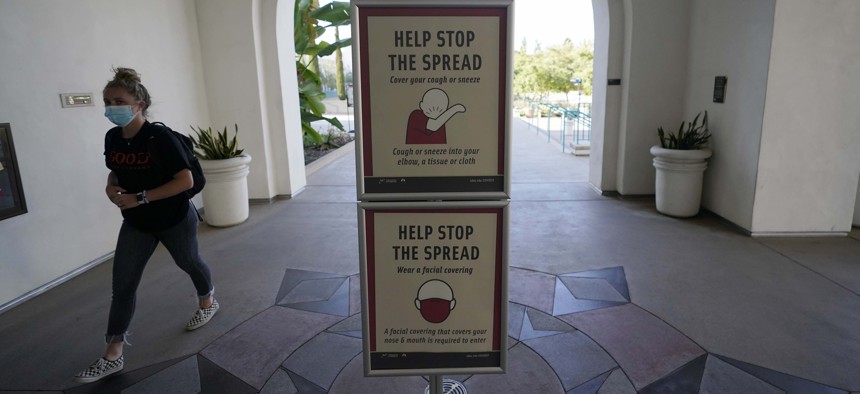New York May Order Colleges With Over 100 Virus Cases to Stop In-Person Classes

A woman wears a mask as she walks on campus at San Diego State University, Wednesday, Sept. 2, 2020, in San Diego. AP Photo/Gregory Bull
The new policy comes as colleges and universities across the U.S. are seeing coronavirus outbreaks.
New York Gov. Andrew Cuomo on Tuesday raised the possibility that the state would force colleges and universities with more than 100 coronavirus cases over a two-week period to temporarily halt in-person classes and switch to online learning.
The move comes as thousands of coronavirus cases are cropping up at colleges around the country as students return to campuses to begin their academic year amid an ongoing pandemic. Cuomo highlighted at least seven schools in New York that have already had outbreaks.
“This is going to be a problem. I am telling you that,” Cuomo said during a press conference.
He said there could be situations where colleges with upwards of 100 cases might be allowed to continue in-person learning.
For instance, Cuomo envisioned giving schools some leeway if an outbreak seems to be centered around a single dorm. Or if the infected students are all on one campus, other campuses within a university system would likely be allowed to continue in-person classes.
But he added that under a new state Department of Health regulation people should “assume 100 is a closure point to remote, unless there are extenuating circumstances.”
“If they go over 100, then the school can be closed down to do remote learning,” he said.
Cuomo specifically lashed out at New York University, located in Manhattan, for not breaking up a large gathering in Washington Square Park over the weekend.
“You have a large gathering, many people without masks, it went on for hours,” he said. “What do you think is going to happen?”
State and local government officials and university leaders across the country are grappling with similar public health concerns.
A database assembled by The New York Times showed that, as of Sept. 3, there were over 51,000 cases at about 1,020 colleges and universities around the country. At that time, more than 100 colleges had reported at least 100 cases, according to the database.
In states like Iowa and Michigan, counties that are home to colleges and universities have seen cases climb in recent weeks.
University leaders and others have raised concerns that if campuses fail to reopen for in-person classes it could hurt their finances, eating into tuition payments and other revenues. College town economies are also hurting as the virus disrupts the normal rhythms of academic life, athletics and nightlife.
Meanwhile, public health officials are warning against letting infected college students return to their home communities, citing fears that they could cause further flare-ups.
“You shouldn’t send them home,” Anthony Fauci, director of the National Institute of Allergy and Infectious Diseases said during a PBS NewsHour interview on Tuesday.
“If you send them back to their community, you will, in essence, be reseeding with individuals who are capable of transmitting infection, many communities throughout the country,” he added.
Fauci recommended that colleges do their best to isolate students who catch the virus from others on campus, possibly by providing a dedicated dorm space where they could recover.
Some universities are already dialing back plans for in-person instruction.
West Virginia University said on Monday that in-person classes at its Morgantown campus would be canceled on Tuesday and that, beginning Wednesday, almost all undergraduate courses based at the campus would move online through at least Sept. 25.
The change, the university said, is in response to a rise in coronavirus cases among students, and due to concerns about parties reportedly held over the Labor Day holiday weekend.
“This pause in face-to-face undergraduate instruction will give us time to monitor the steadily climbing cases,” Jeffrey Coben, dean of WVU's school of public health, said in a statement.
“There is increasing evidence that crowded indoor gatherings, such as those that occurred over the weekend, can serve as super-spreader events,” Coben added.
Over the weekend, the university suspended 29 fraternity members accused of failing to comply with coronavirus-related rules after a member of the fraternity tested positive for the virus.
Last Thursday, Temple University, in Philadelphia, said most of its in-person classes would be canceled for the rest of the fall semester, following an increase in virus cases among students.
San Diego State University, in California, decided to shift face-to-face classes online, beginning Sept. 3, for at least a month or so. The university said in a Monday email to students that its "confirmed and probable" case total among students was 286 since Aug. 24.
In Michigan, virus outbreaks on college and university campuses were driving surging coronavirus case counts in five counties, the news outlet MLive reported on Tuesday.
And in Iowa, Gov. Kim Reynolds suggested last week that colleges and universities were a key contributor to a rise in coronavirus cases that the state experienced in August.
Reynolds noted that the week of Aug. 2 to 8, in Johnson County, where the University of Iowa is located, there were 712 new virus cases for a positivity rate of 9.9%. Of those cases, 18.8% were among 19 to 24 year olds. That was before most students returned to campus, she said.
About three weeks later, Reynolds said, new cases in the county totaled 1,390, the positivity rate jumped to 29.7%, and 74% of the cases were among 19 to 24 year olds.
“We can open our colleges back up,” Reynolds said during a press conference last Wednesday. “We can continue to move forward, but we have to have personal responsibility, we have to be aware of what the data is, and then we have to make decisions based on that.”
Bill Lucia is a senior reporter for Route Fifty and is based in Olympia, Washington.
NEXT STORY: Lawmakers Hope to Allow School Districts—Not Governor—to Set Crowd Size for Sporting Events






